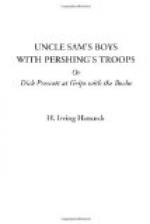“I had forgotten it,” replied the French divisional commander. “What was it?”
“A Hun airman dropped a bomb on the roof. It blew a hole in the roof and worked some damage in your bedroom overhead.”
“It does not matter,” said General Bazain simply.
Bang! bang! smashed overhead.
“It must be the same rascal, returning in his flight!” cried the medical officer, darting out into the yard to look up at the sky. A moment later anti-aircraft guns began to bark. Two minutes after the medical officer again looked into the room.
“We are fortunate to-day, my general!” cried the doctor. “That scoundrel will not bother you again. One of our shots wrecked his plane and brought the Hun down—–dead.”
Evidently, however, that airman of the enemy had given the location and range of division headquarters, for now a shell from a German battery struck and exploded in the yard outside, killing a sentry and wounding two orderlies. A second and a third shell followed. A fourth shell tore away the corner of the house without injuring any one.
“Your orders, my general, in case our observers can locate the Hun battery?” asked a staff officer, coming in from the next room and resting a hand on a telephone instrument.
“If the enemy battery can be located,” replied General Bazain, “let it be destroyed.”
Rapidly the staff officer sent his message to the artillery post of command.
“But surely you will go to a shelter?” asked the staff officer, laying down the instrument when he had finished.
“It will be inconvenient,” sighed the division commander. “The light here is much better.”
Yet General Bazain permitted himself to be persuaded to remove from this now highly dangerous spot. As he and his staff, accompanied by the visitors, stepped outside another shell exploded close at hand, fortunately without doing harm.
Descending to the cellar of a wrecked house near by, in the wake of their hosts, the Americans found the entrance to steps, cut in the earth, leading to a secure shelter on a level much below that of the cellar. Here were two rooms underground, both equipped with desks, lights, chairs, telephones and all that was needed for communicating with the ranking officers of the division at their posts in the trenches.
“It is stupid to have to work under candlelight in the daytime,” sighed the division commander. “However, Major Wells, as I was explaining to you-----”
Here recourse was again had to the maps, which the officers of the staff had brought along.
Before dark supper was served at division headquarters in this dug-out reached through the cellar of a ruined house.
“If it were not that I expect an attack tonight, and must be at my post, it would give me delight to go with you and show you our trenches,” said the division commander at parting.




